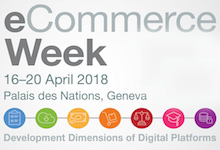E-commerce and women empowerment in developing countries
18 Apr 2018 10:00h - 11:30h
Event report
[Read more session reports from the UNCTAD E-Commerce Week 2018]
The session focused on the role of e-commerce in empowering women in developing countries. The discussion was moderated by Mr Mostafizur Rahaman Sohel (Convener, BASIS E-commerce Alliance, Bangladesh) who stated that nowadays the world is changing under the shared principle of ‘leaving no one behind’. Applied to the trade sector, this also means ‘leaving no entrepreneur behind’, in particular, women. He explained to the audience that the role that women have in Bagladesh’s economy is crucial: they are changing the society and helping the national economy as they empower themselves and their families. This is also thanks to the use of digital technology and social media. In Bangladesh, around 15 000 ‘informal commerce companies’ have now been funded, which women operate simply from their homes through social media.
Mr Daniel Blockert (Ambassador of Sweden to the World Trade Organization (WTO)) presented the Swedish perspective to the discussion. He explained that when Sweden started to look at the gender issue in the field of trade a few years ago, other countries expressed significant scepticism as trade was considered to be gender-neutral. He believed that although the discourse has shifted considerably over the last few years, ‘a lot stills needs to be done as the hard work starts now’. He then focused on e-commerce which he confessed to be a challenge both for developing and developed countries. He maintained that if we look at the data, women are still underrepresented among entrepreneurs. He stated that such issues need to be discussed at the WTO level, and developing countries should also take part in the discussion. He mentioned that the lack of disaggregated data hinders the possibility of developing a precise strategy aiming at empowering women in developing countries. ‘There are still hundreds of women around the world who are invisible to statistics. This is because how can we define what a women-owned business is?’, he added. He concluded by pointing out that the Swedish embassy in Bangladesh has launched a pilot programme, namely a digital business platform for rural women, aiming at enabling entrepreneur women to use technology.
Ms Hanne Melin (Director for Global Public Policy, eBay) affirmed that the number of women starting and running new businesses is growing. She also specified that women’s role in the business sector is higher in countries with a lower level of development because there is also an important margin of opportunity. She explained that the Internet has revolutionised the retail industry for small businesses because it allows producers to reach out to customers that are outside their near community without forcibly investing in local facilities and infrastructures. She showed that the micro, small and medium enterprises (MSMEs) in Latin America and the Caribbean region are serving on average 20-25 different markets. She considered that this is precisely the potential of the digital economy for women entrepreneurs: expanding the traditional retail business. She concluded her presentation by stating that women doing business face a two-fold problem. On the one hand, there are infrastructural limitations namely the need for low-cost connectivity, access to global online payment systems, and cheaper parcel delivery solutions. On the other hand, women have to fight the stereotypes either from their own societies (lack of support) or from the western world. ‘We need to fight the idea that a product made in Africa should be cheap’, she claimed.
Mr Prosper Bizimungu (Founder, bizisol.com) illustrated the Burundishop platform which aims at setting up a platform delivering e-commerce services to the East African market. He believed that women do play a crucial role in commerce as in Burundi they often travel abroad and import goods, operating with a very limited budget. He also stressed the importance of technology and energy for the development of e-commerce. In particular, he stated that the need for connectivity in Burundi is high. He mentioned the efforts of Swedish NGOs in Africa trying to provide energy and connectivity through innovative solutions or through support to existing local initiatives such as the women’s initiative for delivering clean energy in Africa.
Ms Claire Pillsbury (Deputy Director, Global Innovation Forum (GIF)) explained that GIF is an organisation connecting start-ups, businesses, non-profits and stakeholders with government officials in order to highlight opportunities and articulate the challenges of participating in the global market place. She presented three enterprises, namely Rags2riches in the Philippines, Ma Te Sai in Laos and the Batik Boutique in Malaysia as examples of successful businesses created by women, developed thanks to the use of digital technology.
Mr Syed Md Kamal (Country Manager, Master Card, Bangladesh) stated that Bangladesh is one of the countries with the strongest presence of women in the government and in the parliament. He illustrated MasterCard’s 5-year programme providing financial literacy courses to women entrepreneurs in Bangladesh. He maintained that out of the 250 000 women helped so far, most of them have become successful and are currently leading businesses on their own.
By Marco Lotti
Related topics
Related event

